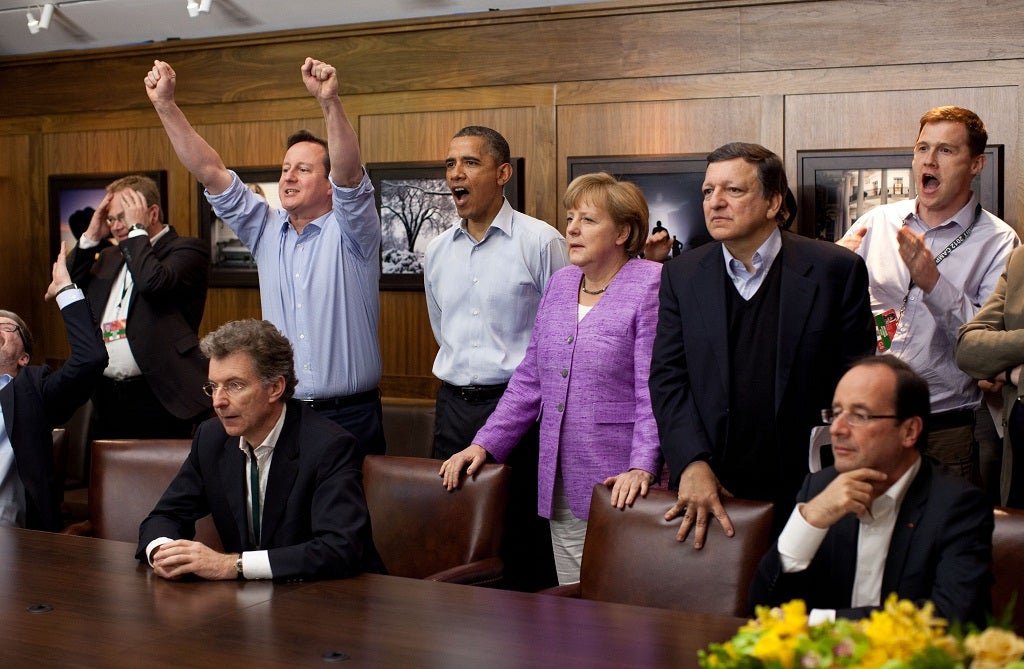The financial crisis requires international thinking. Our leaders just aren't up to it
The hour has certainly cometh, so where is the man or woman we need to lead us?

The reason that the US presidentials are so tight, American commentators say, is not that the race is furious but because the voters are enthused by neither candidate. In the face of voter disengagement, it has become a battle for getting out the vote. May the best machine win.
To which Europeans can only say: “Welcome to the club!” It’s true of Britain and it’s true of Spain, despite the recent change in government. It may prove apt for Germany when Angela Merkel faces re-election next June. And it’s the same for Italy even now that Silvio Berlusconi has finally, and thankfully, announced he won’t be standing in the elections.
Wise heads bemoan the lack of leadership in the West. Younger heads just turn away with a shrug of “that’s politics for you”. It isn’t. The lack of leadership in the West arises not from lack of character. It simply reflects the fact that no government has any real idea of what to do.
Leadership comes when the crisis is clear and the need is urgent. As William Keegan argues in a new book, Saving the World: Gordon Brown Revisited, Brown stepped up to the plate when the financial crisis broke and did well, for all that his reputation since has fallen. But when the immediate crisis seemed to pass, prime ministers became reluctant to tell their public just how bad it continued – and continues – to be.
Governments have a huge overhang of debt that will take decades to pay down. In the meantime, the banks on which they must rely to circulate the money that Central Banks are busily pumping into the system are, as the Governor of the Bank of England warned this week, still frighteningly weak. Put in realistic figures of risk on their debt, most would be bankrupt.
What can ministers say or do? Measures that might ameliorate the pain and reflate the economy cannot be taken at a national level without the risk of causing a rise in interest rates which would push countries over the brink.
So they do what most are doing now: trudge on as best they can while pulling back from the drastic cuts in expenditure that might cause the kind of social upheaval we have seen in Greece. Of course, the world should be acting in unison to allow some reflation. It would be wonderful if we could look to the US, or Germany, to stoke up the engines.
But in the mood of general introversion and parochialism, ministers see no votes in internationalism. Just the opposite. And that is as true of Washington and Berlin as of London. Even their Treasuries feel the limits of a unilateral action that their parliaments would never sanction.
At least Germany and America aren’t making life more difficult by suddenly pulling in their belts (although we may have to await the results of their respective elections to see whether this lasts). And at least national concerns aren’t leading to a revival in militarism, despite the French and British appetite for foreign ventures in troublespots such as Mali.
The price for constraint, however, is the kind of vicious pursuit of individuals to blame that we are witnessing – in the prison sentences handed out to the Italian seismologists who failed to predict the L’Aquila earthquake, and the feeding frenzy that Britain is indulging in over Hillsborough and Jimmy Savile.
Even within the modest expectations of government today, one might hope at least that ministers would dampen down the politics of envy, prepare their voters for years of austerity ahead, and try and raise their eyes to some sense of common purpose with allies abroad. The trouble is that what they are doing is the reverse.
A different earthquake hits Japan
After nearly 20 years defying fiscal gravity, the Japanese may finally be forced to confront reality. The stand-off in the Diet over the Bill enabling the government to fund its deficit – a mind-boggling 200 per cent of GDP – has thrown the markets into confusion and the traders into panic.
The crisis has all the hallmarks of the budgetary logjam on Capitol Hill in the US and could be just as serious. Japan remains the third largest economy in the world. For a generation now, it has suffered economic stagnation while financing ever-larger budget deficits from domestic savings.
If the political stand-off continues while the opposition tries to force an early election, then the state will simply be unable to pay its way. Even if a compromise is reached – as it usually is in Japan – then the effect of the instability on the markets may well be to force up rates.
If that wasn’t enough, it now has to cope with the antics of the nationalistic Governor of Tokyo. Shintaro Ishihara, who’s planning to head a new party, was the man who stoked up the islands conflict with China and has laid about the “establishment” with relish. Quite like some of our homegrown versions, in fact.
Join our commenting forum
Join thought-provoking conversations, follow other Independent readers and see their replies
Comments
Bookmark popover
Removed from bookmarks